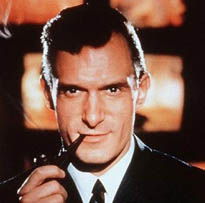by Haley Cullingham
Prompted to describe Hugh Hefner, one’s mind may quickly wander to images of deep and devious cleavage, vacuous blondes with intolerably high pitched vocals, plumes of tobacco smoke and lascivious hot tub parties. Of course, one might also think of fucking – lots of dirty, scandalous, X-rated fucking. However, over quite an illuminating conversation with Brigitte Berman, Academy Award winner and director of the documentary Hugh Hefner: Playboy, Activist and Rebel, we were delightfully surprised to see another side of Hef’s complex character. Our phone call with the passionate Berman began by her telling a story that, frankly, blew our mind.
“In the early 70s, a woman wrote in to Playboy Forum. She was put in prison for 15 years on a charge of manslaughter for having had an abortion. Other letters came in from readers outraged this was happening in America at this time. Mr. Hefner sent his legal team down to Florida, and re-opened the case, and the result was that she was let out of prison, she was given house arrest for a totally minimum sentence, and more importantly, the judge asked for copies of the argument to be used in changing the law for abortion in that state. Which led directly to Roe vs. Wade. When I read that, I just went ‘wow.'” Wow is right.
Berman was immediately attracted and inspired by Hefner and a friendship was eventually formed when Berman sent Hefner a copy of her film, Bix: ‘Ain’t None of Them Play Like Him Yet,” a documentary about jazz legend Bix Beiderbecke. Hefner watched the film and was similarly impressed with Berman’s intelligence and talent, as she was with his. He rang her up and it was decided that he would release the film under the umbrella of Playboy Jazz. (Oh, your mom didn’t gift you with an Anthology of Playboy Jazz CD Box Set for your high school graduation? Okay, then you might not know that Hefner is a huge jazz enthusiast, cultivating taste for decades. Naked girls and jazz used to complement one another in Playboy’s earlier days.)
Although their friendship was seeded by like-minded cultural interests and smart banter, Berman did get a taste for Hef’s other world, the hedonistic, over-the-top, sex fueled circus, when she attended his 80th birthday bash in 2006. Berman tells it like it was, “…amazing. It was my first really sumptuous, incredible Playboy Mansion Party, with the colours, the painted girls, people in lingerie.” But knowing that the Hef wasn’t all tits n’ ass, booze and bravado, Berman thought it strange and intriguing that the activist side of Hefner was so hidden amidst the overwhelming decadence on offer that night. “On the plane back, I said, that is the film I want to make next, a film about the other side of Mr. Hefner. I put together a treatment, and a day later, I received a fax from him saying how much he loved it….he gave me absolute creative freedom.”
The film begins with Hef’s high school years, and traces him through a stale marriage, divorce and vaguely absent fatherhood but consistently we watch his unwavering commitment to his vision and his ideals. Valiant and steadfast in his beliefs indeed, but Berman did not set out to make Hefner out to be a hero, devoid of problems and controversy. Who would believe that? He’s certainly not perfect (really, who is?) but the man who emerges behind Berman’s lens is one to admire: fighting for civil rights, sexual freedoms, freedom of the press and freedom of speech.
The doc shows him breaking ground by refusing to accept imposed bigotry. Walking through the streets of Chicago during the riots, hosting black performers on his television program when no one else would. Enthusiastic about a culture that could talk about sex, enjoy sex, openly, frankly. Fighting for birth control, fighting against sodomy laws, fighting to legalize marijuana. The film shows, as Berman herself discovered, “how personally active he was in creating change.” It also shows feminist rage.
A particularly interesting subject interviewed by Berman is Susan Brown-Miller, who went head to head with Hefner years ago on a talk show, and takes him on again in front of Berman’s lens. “When I met her,” says Berman, “I liked her immediately. Here was a woman who was as passionate about feminism as I am about filmmaking. And I respect and admire passion that is real.”
While Hefner feels he made it okay for the Girl Next Door to like and enjoy sex, Brown-Miller feels he made the girl next door into a fetish object. Berman gives both sides their due diligence, which is why this is a compelling documentary. “It was very, very important to have that in the film,” says Berman.
From Joan Baez to Jenny McCarthy to Rev. Jesse Jackson, Berman tells Hef’s legacy through those who had the privilege of living it alongside him. The one thing about Hefner that is abundantly clear throughout the film is his fierce intelligence. But this, ultimately, was not what struck Berman most about her old friend. “He is a man who dares to the ultimate. He dares and dares and dares and does. Always.”
Hugh Hefner: Playboy, Activist and Rebel plays in select theatres August 6.



 Follow Us On Instagram
Follow Us On Instagram
